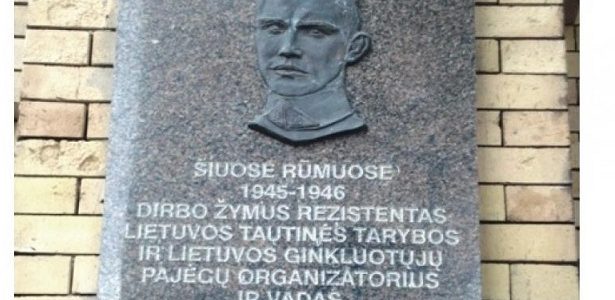A controversial plaque commemorating Lithuanian Nazi collaborator Jonas Noreika came down from the walls of the central Vilnius Academy of Sciences in the early hours of Saturday, July 27.
The take-down was ordered by Vilnius mayor Remigijus Šimašius, according to Lithuanian media reports. In April Šimašius baffled the public and political observers by waffling on the presence of the granite plaque following an incident where Lithuanian human rights advocate and attorney Stanislovas Tomas seemingly destroyed it with a sledgehammer. The next day mayor Šimašius said the sign would not be replaced, but the day after that promised it would be put back immediately. The smashed plaque was repaired and put back on the outer wall of the Academy of Sciences building.
Last week the Vilnius city council approved a measure to rename nearby Škirpa Alley. Kazys Škirpa was the founder and commander of the Lithuanian Activist Front which undertook the mass murder of Jews in Lithuania during the Nazi invasion of the Soviet Union. The council voted to rename the small street in the heart of Vilnius Tricolor Alley in remembrance of Škirpa’s act during the dawn of modern Lithuanian independence in 1919 when he hoisted the tricolor flag of the Lithuanian Republic on top of Gediminas Hill. The same sitting of city council also approved the erection of a sign extolling Škirpa’s alleged heroic acts during World War II on the small street which runs along the Vilnelė creek to where it joins the Neris (Viliya) river in central Vilnius.
Deputy Vilnius mayor Aleksandras Zubriakovas told Lithuanian media mayor Šimašius was not available for comment Saturday and added: “The mayor is striving to insure no signs remain in Vilnius in connection with the totalitarian regimes,” and that Jonas Noreika had “contributed to the strategy of driving the Jews out of Lithuania and confiscation of their property. The position of the city mayor is that there should not be a double standard in place, whether we are talking about [the removal of Soviet statues from] the Green Bridge, Jonas Noreika or Kazys Škirpa.”
Lithuanian media approached Lithuanian Jewish Community chairwoman Faina Kukliansky for comment Saturday, and she told them: “I am very proud of my country, Lithuania, which is ridding itself of black stains on its history, admitting them, and I think this is very good and democratic.”
Grant Gochin, a Litvak living in Los Angeles who has been fighting a lone legal battle for many years on multiple fronts to have the monuments to Noreika and Škirpa removed from the Lithuanian capital, commented on facebook Saturday that the take-down of the Noreika plaque was a good sign and a step in the right direction.
Strange Circumstances
Critics of the removal of the Noreika plaque said it was suspicious the operation had been conducted at 4:00 A.M. early Saturday morning. The municipal enterprise Grinda, the same group which replaced the Noreika plaque within days of its earlier destruction, arrived to take the stone slab down but was not able to do so, because a night watchman called the police, fearing another unauthorized attack. Deputy mayor Aleksandras Zubriakovas countered the take-down was scheduled then in order to minimize potential tension between different groups within the capital city. Following Stanislovas Tomas’s unilateral removal of the sign with a sledgehammer in April, Noreika proponents held demonstrations and candle-light vigils beneath the blank space on the brick wall for almost a week.
Mayor Šimašius at that time suddenly discovered the plaque was actually the property of the Vilnius municipality. He claimed he had found receipts showing the city had ordered the plaque made in the late 1990s. In earlier correspondence the mayor and the city of Vilnius had claimed they had no records concerning the Noreika plaque and said it appeared to have placed on the Lithuanian Academy of Sciences by private initiative and in contravention of city laws.


